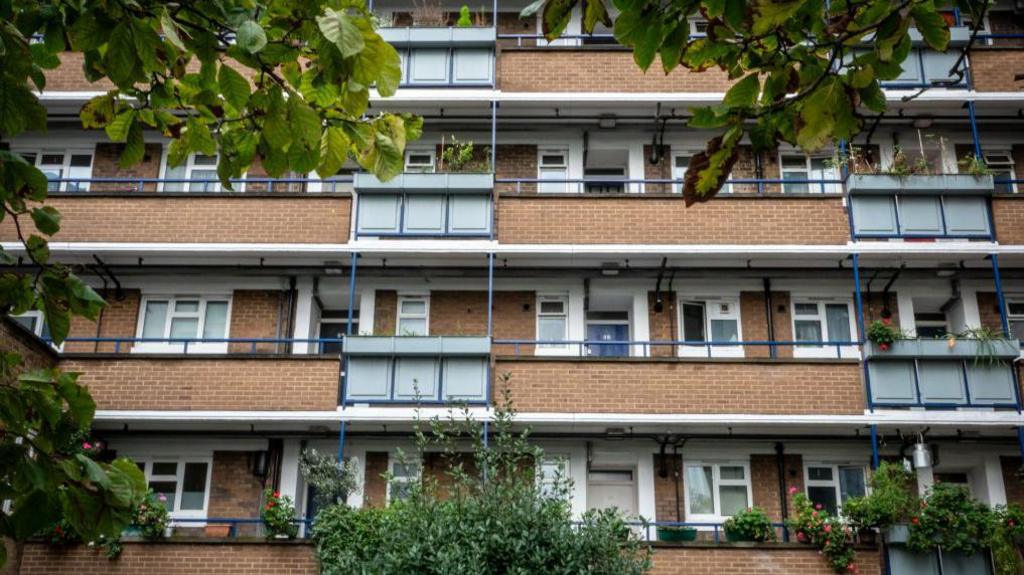Reports of substandard living conditions in English social housing have surged, exceeding five times the level recorded five years prior, according to the Housing Ombudsman.
Housing Ombudsman Richard Blakeway highlighted a concerning “power imbalance” in tenant-landlord dynamics, warning that unresolved housing issues risk escalating from simmering discontent to widespread social unrest.
He cautioned that without significant improvements, England faces the potential for a “managed decline” of its social housing stock.
Common complaints received by the watchdog include asbestos, electrical and fire safety hazards, pest infestations, and persistent issues with leaks, damp, and mold.
The Housing Ombudsman’s latest report reveals that the overall state of social housing, coupled with protracted repair delays, is severely eroding tenant trust.
“Aging properties, escalating material costs, and skills shortages are converging to create a perfect storm,” Mr. Blakeway explained to BBC Radio 4’s Today programme. “This situation is unsustainable.”
He emphasized tenants’ limited influence over service quality, regardless of its inadequacy, leading to growing frustration and dissatisfaction.
While acknowledging record repair and maintenance spending by social landlords—£9 billion between 2023 and 2024—he pointed to historical underfunding as a contributing factor.
He further noted that while landlords have faced funding uncertainties, improvements in communication with tenants, often lacking “dignity and respect,” are crucial.
The Local Government Association (LGA), representing English councils, echoed these concerns, describing the situation as “increasingly unsustainable.”
Councillor Adam Hug, LGA spokesperson, stated: “Many councils face an impossible choice between budget deficits and neglecting statutory repair obligations, including those under Awaab’s Law.”
He urged the government to reinstate over £600 million in lost revenue due to the 2024/25 rent cap and establish a long-term rent settlement ensuring financial stability.
The ombudsman’s report detailed a significant increase in complaints—from 1,111 in the year to March 2020 to 6,380 in the year to March 2025.
Mr. Blakeway identified repairs as the “primary driver” of complaints, constituting nearly half (45%) of those investigated in the year to March 2025.
Citing English Housing Survey data, the report estimated 1.5 million children in England lived in substandard housing in 2023, with 19% residing in social housing.
The Housing Ombudsman advocates for a comprehensive system overhaul, including an independent funding review and a “national tenant body” to enhance tenant representation and landlord accountability.
This body would operate independently from the ombudsman, which currently has the authority to mandate apologies, repairs, or financial compensation from landlords.
“The detrimental impact of poor housing conditions on community cohesion, education, public health, and economic productivity is undeniable,” Mr. Blakeway stated.
“Without change, we risk the gradual decline of one of Europe’s largest social housing systems, particularly in areas with the lowest affordability.
It also risks transforming simmering anger into widespread social unrest.”
This assessment, he emphasized, is neither speculative nor alarmist, referencing historical tenant activism, the Grenfell Tower tragedy, and the death of two-year-old Awaab Ishak.
The 2017 Grenfell Tower fire, claiming 72 lives, and Awaab’s 2020 death due to mold exposure have underscored critical housing safety and standards issues.
The ombudsman’s report cited instances such as a child’s bedroom windows remaining boarded up for four years and asbestos-containing collapsed ceilings left unrepaired for two years, forcing a family to cover the holes with bin bags.
The report also detailed specific cases of landlord-tenant disputes. One involved a woman with autism and mobility issues whose toilet problems, resulting in mold and damp, were poorly handled, including a repair call at 2:15 AM.
The landlord claimed unawareness of her disabilities.
Housing campaigner Kwajo Tweneboa expressed “shock, but not surprise,” at the report’s findings.
He noted that complaints reaching the ombudsman represent only those formally reported to landlords, highlighting a deeper issue of tenants feeling unheard and experiencing a flawed organizational culture.
“They feel like mere numbers at the end of the month,” he stated.
Mr. Tweneboa described cases where families have resorted to using bin bags and bottles due to prolonged lack of toilet access.
The National Housing Federation, representing English housing associations, affirmed that home quality and safety are top priorities, emphasizing record spending on repairs and maintenance.
Chief executive Kate Henderson attributed existing quality issues to years of funding cuts and stressed the need for increased long-term funding.
Addressing the report during a Thursday business engagement, Prime Minister Sir Keir Starmer reiterated the “fundamental right to safe housing,” emphasizing its centrality to the government’s housing agenda.
A Ministry of Housing spokesperson stated: “Everyone deserves safe, secure housing, and despite inherited challenges, we’re taking decisive action.” They cited Awaab’s Law and competency standards for social rented sector staff.
Sign up for our Politics Essential newsletter to keep up with the inner workings of Westminster and beyond.
Charity launches legal challenge as it says problem of over-capacity sewage works near new homes is “rife”.
A UK Health Security Agency spokesperson said the risk to the general public is “very low”.
Parents of children at schools have called on a council to reinstate crossing patrols.
Separate bills which would let terminally ill people end their life are being considered at Westminster and in Scotland.
The government says “every single penny” raised by the policy will be spent on state schools.

